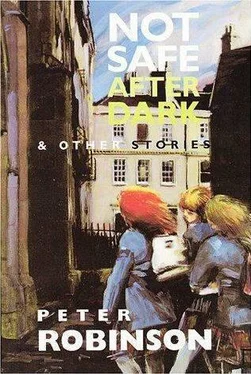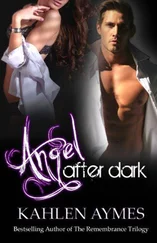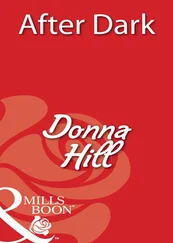‘Go on.’
‘Do you know how the old barbers’ shops had a sort of hallway with a counter between the outer and inner door, nice and private, where you could buy shampoo and razor blades and stuff?’
‘And rubber Johnnies?’
‘And rubber Johnnies.’
‘I remember. My dad used to take me to the barber’s with him sometimes when I was a little girl.’
‘Right,’ Banks went on. ‘Well, as I said, I’d walked halfway to Cambridge and there I was, bold as brass, outside a barber’s on a street where not a soul could possibly know who I was.’
Kay smiled. ‘What happened?’ She moved her head and her hair tickled his chest.
‘Well, wouldn’t you know it, but this particular establishment didn’t have a discreet sales area. Oh no. I opened the front door and I found myself standing right by the barber’s chair. He was giving a bloke a shave, I remember, and the place was full of grown men. I mean, every chair in the waiting area was taken, and I swear that the minute I walked in there they all looked up from their newspapers and every eye was on me.’
‘My God! What did you do?’
‘What could I do? I’d gone too far to turn back. I stood my ground and I said, in as deep a voice as I could manage, “Packet of three, please.”’
Kay put her hand to her mouth to hold back the laughter. ‘Oh, no!’ she said. ‘You’re joking?’
‘No word of a lie.’
‘What did he say? The barber.’
‘Not a word. He stopped mid-shave, straight-blade razor in his hand, and he went to his cabinet and got them for me. But you should have heard the other buggers laugh and cheer. You’d think Peterborough United had won a game. I went red as a beet.’
Kay burst into a fit of laughter and couldn’t stop. Banks started laughing with her, holding her against his chest, and after a while laughter turned to lust.
It was after two o’clock when Banks slipped the key into the door of his parents’ house and turned the lock as quietly as he could. He shut the door slowly behind him, without making much noise, and made sure the chain and bolt were on. The stairs creaked a little as he tiptoed up to bed. He couldn’t very well go and brush his teeth as he would have to put the bathroom light on and the tap would make a noise. He thought he could just about manage to undress and crawl into bed in the dark. The bed would creak too, but that couldn’t be helped. Fortunately, he’d had the foresight to use the toilet before leaving Kay’s.
The minute he got to the landing he heard his mother muttering something to his father, who muttered something back. He couldn’t catch the words but knew they were about him, how late he was. He felt himself blushing. Christ, it really didn’t matter how quiet he had tried to be; she’d been lying awake until he came home, just like she used to do when he was a teenager.
Despite his late night, Banks woke early on Sunday morning to the sound of rain blowing in sharp gusts against his bedroom window. The rest of the house was quiet, and he didn’t think his parents were awake yet. His first thought on finding consciousness was to wonder what the hell he and Kay had thought they were up to last night, but the more he remembered the less he regretted. Blame it on Billie Holiday, if you will, on dancing, the old estate and the romance of the past, but whatever it was, it was something special and he refused to feel guilty.
He only hoped Kay felt the same way in the damp grey of dawn.
Two memories assailed him almost simultaneously as he got out of bed and went over to the wardrobe for his overnight bag: that he had forgotten to give Kay her old copy of Lady Chatterley’s Lover and that he was certain he had seen a tiny, neatly folded square of silver paper in the bathroom waste bin. Perhaps Mrs Summerville had taken to chewing gum in her final days, though he doubted it, or maybe Kay did, though he had seen no evidence of it last night, and he remembered that she had bought mints at the newsagent’s, not gum. Which left him with the strongest suspicion that Geoff Salisbury had been there sometime over the past few weeks, leaving Banks little doubt as to where the hundred pounds had gone.
What to do about him, that was the question.
Banks stretched as he pulled out his bag and decided to start the day dressed simply, in jeans and a polo-neck sweater. He would change for the party later. Today was his parents’ big day, and Roy was due to come up from London. Banks resolved to be nice to Roy for his parents’ sake.
As Banks put his bag back in the wardrobe, he noticed some cardboard boxes on the far side. On his previous visit he had found some old records and diaries, which were still there, but now it looked as if there was more. Curious, he opened the other door and lifted a box out. The flaps were shut, but not sealed, and written across the top, in his mother’s inimitable scrawl, was his name: Alan . More childhood stuff, then.
On top he found yet more old school reports, from the grammar school this time, most of them urging him to try harder and assuring him he could do better if he only put his shoulder to the wheel etc. The reports were handwritten in black ink, and Banks occasionally had difficulty reading the comments. He remembered some of the teachers’ names – Mr Newman, Mr Phelps, Mr Hawtry – but most of them were a blur.
Along with the reports was a class photograph dated 14 May 1967. There they all were, three rows of teenage boys in their school uniforms. Banks remembered several of the faces: Steve Hill, Paul Major, Dave Grenfell, his best friends, then Tony Green, John McLeod, the school bully, and Ian Marston, who, so Banks’s mother had told him, committed suicide seven or eight years ago after his courier business failed. The rest of them he hardly remembered except for the odd feature here and there, such as a long, freckled face, a big nose, or prominent ears, but he couldn’t put a name to them. He had met up with Dave Grenfell and Paul Major on his previous visit, and he had found out then that Steve Hill had died of lung cancer, but what had become of everyone else he had no idea. Others would be dead, some would be dying, some would be successful, some would be failures, some would be criminals, many would be divorced. There was one angry-looking kid glaring into the camera with a cocky expression on his face, black hair just a little bit too long, tie slightly askew, top button undone against school regulations. Himself. Even more of a mystery than all the rest.
Next came a few school exercise books full of sums and compositions. One of them contained some poems Banks had written when he went through that stage of adolescence in which poetry was an acceptable means of expression as long as you kept it to yourself. It was with excruciating embarrassment that he looked over them again now, with the autumn rain starting to spatter against his bedroom window.
There were lines about the awkwardness of being an adolescent, love poems to Julie Christie and Judy Geeson, poems about how phony the world was. None of them rhymed, of course, nor were any overly concerned with metrics; the lines simply ended where he had decided to end them, for no other reason than that it looked like poetry on the page. There were no capital letters, either. Still, Banks reflected, from what he had seen that wasn’t a hell of a lot different from the sort of thing most published poets did today. Awful lines and images jumped out at him, such as ‘I feel like a corpse/in the coffin of your mind.’ What on earth had prompted him to write that? About what? He couldn’t even remember whose mind was supposed to be the coffin. And then there was a poem marked, ‘For Kay’, in which these immortal lines appeared:
Читать дальше










![Джеймс Чейз - Not Safe to Be Free [= The Case of the Strangled Starlet]](/books/417649/dzhejms-chejz-not-safe-to-be-free-the-case-of-the-thumb.webp)

